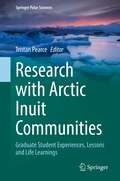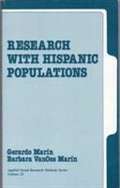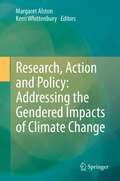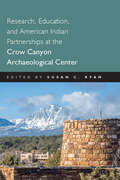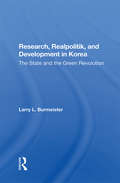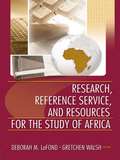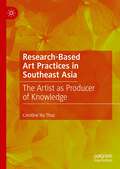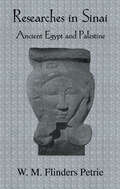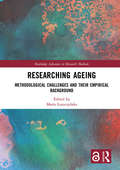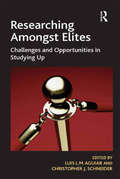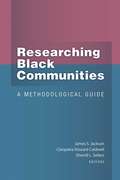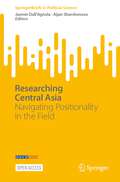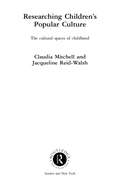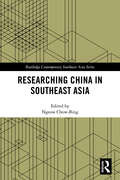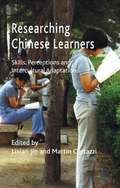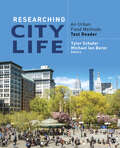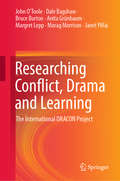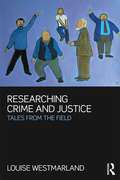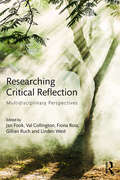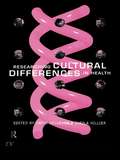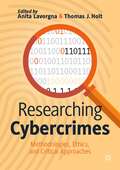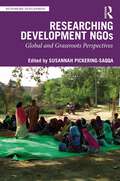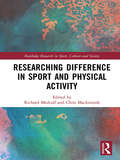- Table View
- List View
Research with Arctic Inuit Communities: Graduate Student Experiences, Lessons and Life Learnings (Springer Polar Sciences)
by Tristan PearceThis book shares graduate student experiences, lessons, and life learnings from research with Inuit communities in the Canadian Arctic. The results of graduate student research are often disseminated in a thesis or dissertation, but their personal experiences building relationships with Inuit, working together to design and conduct research, and how this shaped their research approach and outcomes, are rarely captured. As such, there are limited resources available to new researchers that share information about the practical aspects of community-based research in the Arctic. The book is intended to provide a glimpse into what it is like to do research together with Inuit, and in doing so, contribute to the development of more productive and equitable relationships between Inuit and researchers. The chapters are written as structured narratives in the first-person and include reflections, and lessons learned.
Research with Hispanic Populations
by Gerardo Marin Barbara Vanoss MarinThe authors discuss different issues related to research with Latino populations.
Research, Action and Policy: Addressing the Gendered Impacts of Climate Change
by Kerri Whittenbury Margaret AlstonResearch, Action and Policy: Addressing the Gendered Impacts of Climate Change presents the voices of women from every continent, women who face vastly different climate events and challenges. The book heralds a new way of understanding climate change that incorporates gender justice and human rights for all.
Research, Education and American Indian Partnerships at the Crow Canyon Archaeological Center
by Susan C. RyanThis volume celebrates and examines the Crow Canyon Archaeological Center’s past, present, and future by providing a backdrop for the not-for-profit’s beginnings and highlighting key accomplishments in research, education, and American Indian initiatives over the past four decades. Specific themes include Crow Canyon’s contributions to projects focused on community and regional settlement patterns, human-environment relationships, public education pedagogy, and collaborative partnerships with Indigenous communities. Contributing authors, deeply familiar with the center and its surrounding central Mesa Verde region, include Crow Canyon researchers, educators, and Indigenous scholars inspired by the organization’s mission to further develop and share knowledge of the human past for the betterment of societies. Research, Education, and American Indian Partnerships at the Crow Canyon Archaeological Center guides Southwestern archaeology and public education beyond current practices—particularly regarding Indigenous partnerships—and provides a strategic handbook for readers into and through the mid-twenty-first century. Open access edition supported by the Crow Canyon Archaeological Center King Family Fund and subvention supported in part by the Crow Canyon Archaeological Center and the Arizona Archaeological and Historical Society.
Research, Education and American Indian Partnerships at the Crow Canyon Archaeological Center
by Susan C. RyanThis volume celebrates and examines the Crow Canyon Archaeological Center’s past, present, and future by providing a backdrop for the not-for-profit’s beginnings and highlighting key accomplishments in research, education, and American Indian initiatives over the past four decades. Specific themes include Crow Canyon’s contributions to projects focused on community and regional settlement patterns, human-environment relationships, public education pedagogy, and collaborative partnerships with Indigenous communities. Contributing authors, deeply familiar with the center and its surrounding central Mesa Verde region, include Crow Canyon researchers, educators, and Indigenous scholars inspired by the organization’s mission to further develop and share knowledge of the human past for the betterment of societies. Research, Education, and American Indian Partnerships at the Crow Canyon Archaeological Center guides Southwestern archaeology and public education beyond current practices—particularly regarding Indigenous partnerships—and provides a strategic handbook for readers into and through the mid-twenty-first century. Open access edition supported by the Crow Canyon Archaeological Center King Family Fund and subvention supported in part by the Crow Canyon Archaeological Center and the Arizona Archaeological and Historical Society.
Research, Realpolitik, And Development In Korea: The State And The Green Revolution
by Larry BurmeisterThis book explores the politics of Korean developmental state and commitment of state agents to rapid industrialization within world political economy, focusing the Korean green revolution. It assesses how differences in state/society relationships affect agricultural research system priorities.
Research, Reference Service, and Resources for the Study of Africa
by Linda S KatzExperts present proven methods and techniques for studying about or in Africa! Research, Reference Services, and Resources for the Study of Africa helps you steer clear of washouts, cave-ins, and dead ends on the road to successful research on-or in-Africa. This one-of-a-kind research guide presents practical solutions to frequently occurring problems in the study of Africa, including Internet accessibility problems, errors that will affect a "known item" search, the imposition of colonial legacy, and dealing with gender and class bias. Unlike most references on Africa that concentrate on collection development, this unique book focuses on the study of Africa, making it a must-have for academic librarians, Africanist scholars, and Africana librarians. Specialists, generalist librarians, and end users all depend on tools designed to provide access to information in libraries and on the web including OPACs databases, and search engines. In this book, these tools, research methods, and the accessibility of information on Africa are examined, offering students and professionals a thorough guide to the most successful researching route. Research, Reference Services, and Resources for the Study of Africa provides assistance in the research process according to a variety of categories including: evaluating OPACs and similar databases for known-item searching using keywords, subject headings, bias, indexing, full-text searching, terminology, cataloguing, user-centered information services, and other search strategies to find what you are looking for using Internet resources to your advantage using the partnerships between the U.S. and African libraries and scholarly institutions to help improve information access using techniques for reference librarians to act as a force increasing women&’s roles in the study of Africa and much more! Research, Reference Services, and Resources for the Study of Africa offers all the information necessary to avoid research hang-ups that affect the study of Africa, and the necessary information to pass these skills on to students.
Research-Based Art Practices in Southeast Asia: The Artist as Producer of Knowledge
by Caroline Ha ThucThis book is the first overall study of research-based art practices in Southeast Asia. Its objective is to examine the creative and mutual entanglement of academic and artistic research; in short, the Why, When, What and How of research-based art practices in the region. In Southeast Asia, artists are increasingly engaged in research-based art practices involving academic research processes. They work as historians, archivists, archaeologists or sociologists in order to produce knowledge and/or to challenge the current established systems of knowledge production. As artists, they can freely draw on academic research methodologies and, at the same time, question or divert them for their own artistic purpose. The outcome of their research findings is exhibited as an artwork and is not published or presented in an academic format. This book seeks to demonstrate the emancipatory dimension of these practices, which contribute to opening up our conceptions of knowledge and of art, bestowing a new and promising role to the artists within the society.
Researches In Sinai (Cambridge Library Collection - Egyptology Ser.)
by PetrieFirst published in 2005. Routledge is an imprint of Taylor & Francis, an informa company.
Researching Ageing: Methodological Challenges and their Empirical Background (Routledge Advances in Research Methods)
by Ska Maria 321 Uszczy 324This book explores the diversity of methodological approaches to researching ageing, considering which methodological paradigm best captures the phenomenon. Interdisciplinary in scope, it brings together research from scholars from Austria, Canada, France, Hong Kong, Israel, Poland, UK and USA to uncover the conditions under which qualitative and quantitative approaches to research on ageing can best be reconciled and rendered complementary. Presenting international reflection on methods for studying old age from a variety of research backgrounds, Researching Ageing showcases the latest research in the field and will appeal to scholars across the social sciences, including sociology, demography, psychology, economics and geography, with interests in gerontology, ageing and later life.
Researching Amongst Elites: Challenges and Opportunities in Studying Up
by Christopher J. Schneider Luis L.M. AguiarAcademics often direct their research 'across' in order to examine issues that grip members of the middle classes, or 'down' in order to understand the difficulties workers and other marginalized groups endure. Research that is directed 'up' at individuals and groups with positions of greater wealth and power is less common, yet 'studying up' can contribute to our understanding of growing inequality, economic polarization and social change by studying the rich, powerful and elite in our society. Presenting the latest empirical case studies from Canada, The USA and Australia, this volume explores the challenges and difficulties involved in conducting research amongst the rich and elite, whilst shedding light on the manner in which power is harnessed, protected and controlled to manage and manipulate resources. A demonstration of the importance of studying up to our understanding of decision-making, governance and the nature of contemporary democracy in the global economy, Researching Amongst Elites will be of interest to sociologists, anthropologists and geographers working in areas such as social research methods, social stratification, the sociology of elites and relations of class, wealth and power.
Researching Black Communities: A Methodological Guide
by Sellers Caldwell Jackson James S. Cleopatra Howard Sherrill L.Experts from a range of discipline offer practical advice for conducting social science research in racial and ethnic minority population. Readers will learn how to choose appropriate methods - longitudinal studies, national surveys, quantitative analysis, personal interviews, and other qualitative approaches - and how best to employ them for research on specific demographic groups. The Volume opens with a brief introduction to the difficulty of defining a population and designing a research program and then moves to illustrative examples draw from the contributorsÆ own studies of Blacks in the United States, the Caribbean and South African. Case studies covers research on the media, mental health, churches work, marital relationships, education, and family roles. Book jacket.
Researching Central Asia: Navigating Positionality in the Field (SpringerBriefs in Political Science)
by Aijan Sharshenova Jasmin Dall’AgnolaThis open access book explores some of the struggles and challenges that researchers and practitioners face when conducting research in the Central Asian research setting. Written for scholars still in the planning stages of their research, it addresses key questions, including: How shall we problematize and reconceptualize the concept of positionality through lenses of local voices from the region? How does practitioners’ and scholars’ positionality contribute to their experiences of inclusion, exclusion, and access to the field? How do scholars navigate issues of personal safety and mental well-being in the more closely monitored societies of Central Asia? The book includes contributors from both Central Asia and Western countries, paying particular attention to the ways researchers’ subjectivity shape how they are received in the region, which, in turn, influences how they write about and disseminate their research. In featuring an even greater variety of voices, this book fills an important gap in the literature on field research and knowledge production in and on Central Asia.
Researching Children's Popular Culture: The Cultural Spaces of Childhood (Media, Education and Culture)
by Claudia Mitchell Jacqueline Reid-WalshThe place of childhood in popular culture is one that invites new readings both on childhood itself, but also on approaches to studying childhood. Discussing different methods of researching children's popular culture, they argue that the interplay of the age of the players, the status of their popular culture, the transience of the objects, and indeed the ephemerality - and long lastingness - of childhood, all contribute to what could be regarded as a particularized space for childhood studies - and one that challenges many of the conventions of "doing research" involving children.
Researching China in Southeast Asia (Routledge Contemporary Southeast Asia Series)
by Ngeow Chow-BingThis book maps out the state of China Studies in seven Southeast Asian countries from different perspectives. It looks at the history, current status, and characteristics of the study of China in Indonesia, the Philippines, Thailand, Vietnam, Malaysia, Singapore, and Myanmar, and what factors shaped the development and prospects of Sinology and Chinese Studies in these countries. For the first time, China experts from within and outside of this region, using a wide range of biographical, historical, bibliographical and comparative methodologies, tell the stories of how intellectuals and scholars in selected Southeast Asian countries understand, study, and research China. Their studies are providing different perspectives and discourses on China. Chapters discover and explore common factors such as the presence of sizeable ethnic Chinese communities, historical and current interactions between China and Southeast Asia, and the diverse intellectual influences in the region. A novel insight into the study of China in Southeast Asia, this book will be of interest to academics in the fields of China–Southeast Asia relations, the intellectual history of Southeast Asia, the intellectual history of Chinese Studies in the world and the politics of Knowledge production.
Researching Chinese Learners
by Lixian Jin Martin CortazziThis collection focuses on Chinese learners with original data sets using innovative research methods. It investigates Chinese learners' learning and language skills, perceptions and particularly the processes of reciprocal intercultural adaptations in a wide international context of Australia, Canada, China, Hong Kong, New Zealand and the UK.
Researching City Life: An Urban Field Methods Text Reader
by Michael Ian Borer Tyler S. SchaferResearching City Life: An Urban Field Methods Text-Reader examines the city from a street level perspective and provides readers with tools to conduct research on urbanism—the everyday experiences of people in cities. Contending that culture is central to understanding urbanism, editors Tyler Schafer and Michael Ian Borer address qualitative research in cities and how it provides insights unable to be captured via quantitative methods. Carefully selected and edited readings cover participant observation, interviewing, narrative analysis, visual and sensory methods, and methods for (re)presenting the city. Each section includes an introduction from the editors, a Reflection Essay from one of the authors, and exercises that prompt hands-on experience.
Researching City Life: An Urban Field Methods Text Reader
by Michael Ian Borer Tyler S. SchaferResearching City Life: An Urban Field Methods Text-Reader examines the city from a street level perspective and provides readers with tools to conduct research on urbanism—the everyday experiences of people in cities. Contending that culture is central to understanding urbanism, editors Tyler Schafer and Michael Ian Borer address qualitative research in cities and how it provides insights unable to be captured via quantitative methods. Carefully selected and edited readings cover participant observation, interviewing, narrative analysis, visual and sensory methods, and methods for (re)presenting the city. Each section includes an introduction from the editors, a Reflection Essay from one of the authors, and exercises that prompt hands-on experience.
Researching Conflict, Drama and Learning: The International DRACON Project
by Bruce Burton Margret Lepp Morag Morrison John O'Toole Dale Bagshaw Anita Grünbaum Janet PillaiThis book offers a comprehensive and critical guide to research and practice in the field of arts education and conflict management. The DRACON project explores the relationship between drama and conflict transformation. This international, interdisciplinary and comparative action research project, begun in 1996, is aimed at improving conflict management and transformation among adolescent school students using the medium of educational drama.The book reports on the underpinning principles, and on action research practice in Malaysia, Sweden and Australia. The strategies and techniques, which were revolutionary when first introduced, are now tried and tested. The book chronicles the history, successes, opportunities and challenges of the original 10-year project, and brings the story up to date by highlighting some of its many legacies and resulting influences around the world. This book will benefit researchers, academics and graduate students in Education, the Social Sciences, Dispute Resolution and the Performing Arts.
Researching Crime and Justice: Tales from the Field
by Louise WestmarlandThis book provides an introduction to research and some of the methods in the field of crime and justice and related areas, including police, prisons and criminal justice policy making. Less a dry 'how to' book, it is concerned rather to provide a wide-ranging discussion that illustrates the kind of research that has been done in particular areas, the findings of previous studies, the pitfalls of ‘real life’ research (and some potential solutions) and the range of possible research methods and approaches – both qualitative and quantitative. It shows how appropriate methods are chosen for particular studies and explores the theoretical underpinnings of the studies, including how and why researchers use theory; the political and ethical issues; and the role of emotions such as fear and danger in researching the field of crime and criminal justice. Key features include: First hand interviews with leading ‘hands on’ academics Examples, excerpts and sources of original research Analysis of the theories, methods and outcomes of previous research Throughout the book there is an emphasis on the often troublesome (and often ignored) relationship between the topic of study, desired outcomes and suitable methods, with a wide range of illustrative case studies. Here the approach is practical - pointing out the different approaches various studies have used and how their outcome is often determined by their choice of methods. The book also reflects on the philosophies of research and includes discussions about the way the choice of methods will be reflected in the findings and vice versa (which seems obvious but is often forgotten). Researching Crime and Justice: Tales from the Field will be an essential source of inspiration and ideas for criminology students and other researchers on crime and justice.
Researching Critical Reflection: Multidisciplinary Perspectives
by Jan Fook Gillian Ruch Fiona Ross Val Collington Linden WestCritical reflection helps professionals to learn directly from their practice experience, so that they can improve their own work in an ongoing and flexible way – something essential in today’s complex and changing organisations. It allows change to be managed in a way which enables individuals to preserve a sense of what is fundamentally important to them as professionals. It is particularly important as it can also help make sense of some fundamental issues, and so also has implications for how we live our lives. However, more systematic research on critical reflection is needed to help us understand what works best for professionals in different settings. This timely work explores how critical reflection is researched, evaluated and used as a research method itself, with the aim of improving how it is taught and practised in a rigorous and transferable way. Developing a more comprehensive and multi-disciplinary view of the current state of critical reflection and the research directions which need to be taken, the book is divided into four parts. It: - Provides an overview of different perspectives on critical reflection and stimulates dialogue between them - Establishes some common platforms from which to develop further research directions - Identifies the major issues in evaluating critical reflection teaching, and main methods for doing so - Contributes to social science methodological innovations by exploring how methods based on critical reflection can be used for researching professional practice - Contains contributions from academics who are internationally known and highly experienced in different aspects of critical reflection. Researching Critical Reflection is an important reference for all students, practitioners, and researchers – including in the areas of education, management, health and social work – who engage with critical reflection to develop their practice.
Researching Cultural Differences in Health
by David Kelleher Sheila HillierSignificant concerns about the poor health and prevalence of chronic illness amongst a number of ethnic minority populations have led to heightened debates about how best to improve the situation. For some the answer is to see their experiences as part of the general social class inequality in health, but recent evidence questions the extent to which social class can explain the variations in health which ethnic minorities experience. Researching the Cultural Differences in Health offers a range of accounts of how people in ethnic minority groups perceive and manage their illness. Some of the chapters focus on Bangladeshi, and other South Asian groups, as well as Afro-Caribbeans and Irish people. The illness conditions discussed include diabetes, hypertension, sickle-cell disorder, mental illness and coronary heart disease. This book will provide invaluable reading for those involved in providing health services for ethnic minorities, and all lecturers and students in medical and nursing education as well as those studying sociology and social administration.
Researching Cybercrimes: Methodologies, Ethics, and Critical Approaches
by Anita Lavorgna Thomas J. HoltThis edited book promotes and facilitates cybercrime research by providing a cutting-edge collection of perspectives on the critical usage of online data across platforms, as well as the implementation of both traditional and innovative analysis methods. The accessibility, variety and wealth of data available online presents substantial opportunities for researchers from different disciplines to study cybercrimes and, more generally, human behavior in cyberspace. The unique and dynamic characteristics of cyberspace often demand cross-disciplinary and cross-national research endeavors, but disciplinary, cultural and legal differences can hinder the ability of researchers to collaborate. This work also provides a review of the ethics associated with the use of online data sources across the globe. The authors are drawn from multiple disciplines and nations, providing unique insights into the value and challenges evident in online data use for cybercrime scholarship. It is a key text for researchers at the upper undergraduate level and above.
Researching Development NGOs: Global and Grassroots Perspectives (Rethinking Development)
by Susannah Pickering-SaqqaThis book offers a critical insight into how the study of NGOs can be more theoretically grounded and methodologically creative. The role of NGOs in global development has been the focus of considerable research and scholarship for the last four decades. More recently, scholars and NGO practitioners have begun to explore their relationships and how research can better inform practice and vice versa. This book addresses questions arising from such research, including: how different theoretical perspectives can be applied to the study of NGOs; what kinds of data can be used when trying to better understand NGOs; and what methods can be used in studying NGOs. Rather than evaluating the impact of NGO work, this is a book about how researchers and practitioners can better understand what NGOs do and how they operate. Bringing together work from a range of NGO researchers working across diverse disciplines and at varied stages of their academic careers, the collection is supported by recent case studies in the field as well as ‘dilemma boxes’ and discussion questions in every chapter. As such, Researching Development NGOs is an essential resource for postgraduate students of Research Methods in Development Studies, NGOs and Development Management as well as practitioners wanting to find out more about the sector.
Researching Difference in Sport and Physical Activity (Routledge Research in Sport, Culture and Society)
by Richard Medcalf Chris MackintoshResearching Difference in Sport and Physical Activity goes beyond the content of introductory research methods texts to provide an insight into the methodological hurdles that are experienced when researching ‘difference’ in Sport and Physical Activity. Contributors reflect upon how the rhetoric of research methodology transfers into the reality of data collection across ‘difference’. Presenting case studies of real research projects, the book covers a range of topics, such as: disability in sport and physical activity vulnerable children in sport and physical activity visual research tools when working with children in a primary school setting physical activity, sedentary behaviour and obesity through childhood diverse ethnic groups in sport and physical activity settings. Each chapter contends with practical issues of power and representation within the research process, to recognise how a researcher–participant relationship that considers those who are ‘othered’ serves to change the dynamics and processes of research. This is an important resource for students of all sports related subjects and essential reading for anyone interested in the study of marginalised populations in sport and physical activity.
